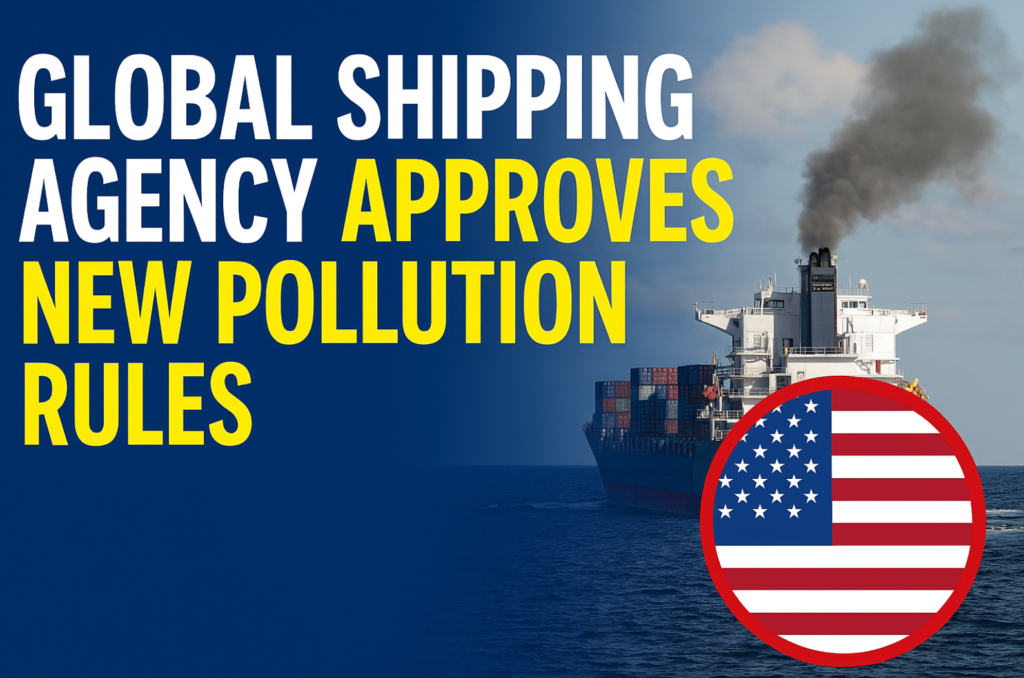Countries around the world have agreed to strict new rules to reduce pollution from ships. The decision was made on Friday by the International Maritime Organization (IMO), a United Nations agency. However, the U.S. disagreed with the plan and left the talks early.
The new rules aim to cut harmful emissions from ships by 20% by 2030. The long-term goal is to eliminate all emissions by 2050. To achieve this, the IMO will introduce two pollution limits starting in 2028. Ships that pollute less than the stricter limit will get rewards, while those that exceed the main limit will face fines.
The U.S. walked out of the talks in London this week. It urged other countries to do the same and warned it would take action if American ships were charged fees. Despite this, most nations supported the plan, seeing it as a necessary step to fight climate change.
How the New System Will Work
From 2028, ships must follow two pollution standards:
- Main Limit: All ships must stay below this level.
- Stricter Limit: Ships that pollute less than this will earn rewards.
If a ship emits more than the main limit, it will be fined
Here’s how the penalty system works:
- Ships that go over the first (basic) limit will be fined $380 per metric ton of CO2 released beyond that level.
- Ships that exceed the stricter limit but still remain under the basic cap will pay a lower penalty of $100 per ton.
- Vessels that stay well below the strict level will earn carbon credits. These credits can be sold to other ships that are not meeting the standards.
For example:
- By 2030, ships must cut emissions by 8% compared to 2008 levels to meet the main limit. The stricter limit requires a 21% reduction.
- By 2035, the main limit tightens to 30%, while the stricter limit becomes 43%.
Cleaner ships will earn credits, which they can sell to ships that fail to meet the standards.
Not all countries supported the plan. Some, like China, Brazil, and Saudi Arabia, opposed a stronger carbon tax proposed by the European Union and Pacific nations. The final agreement was reached after compromises.
Saudi Arabia, Russia, and Iran even demanded a vote—something rare at the IMO, where decisions are usually made by agreement.
The rules still need final approval at an IMO meeting in October. If passed, they will take effect in 2028.
This decision marks a big step in reducing shipping pollution, but challenges remain. With the U.S. opposing the fees, future tensions could arise over how these rules are enforced globally.
The world’s shipping industry, responsible for nearly 3% of global CO₂ emissions, is now under pressure to go green—whether all nations agree or not.

Recent Posts
Important Bank Holiday Trading Hours Update – January & February 2026
Tata Power-DDL launches Solar Sakhi Abhiyan
Next-Gen GST Reform: A Historic Diwali Gift for the Nation
Angel One Stock Broker Review
Income Tax Alert: ITR Filing Last Date for FY 2024-25 (AY 2025-26)
TikTok in India: The Buzz, the Ban, and What’s Really Happening
Wordle Answer Today (August 20, 2025): Hints and Full Solution Explained
Google Expands Store in India and Faces Global Play Store Challenges
Ola Electric Shares Recover Strongly After Heavy Fall in 2025
Gold Price Today: Rates Fall as Strong Dollar Impacts Market
Shreeji Shipping Global IPO Sees Strong Demand, GMP Suggests Listing Gains
India Approves ₹62,000 Crore Deal for LCA Tejas Mark 1A, HAL Shares Gain